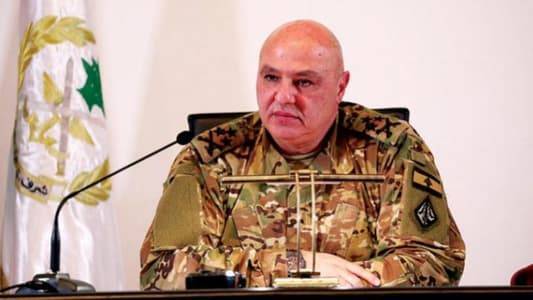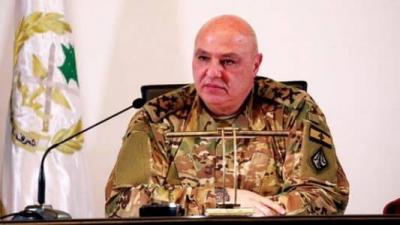Prominent political sources in Beirut are betting that with the arrival of the new year, the Lebanese presidential election crisis will enter a new phase, different from the current one characterized by ongoing obstruction to elect a president and the extension of vacancy in the presidential seat. The sources confirm to "Asharq Al-Awsat" that the upcoming phase will reconfigure the political landscape, with the name of Army Commander General Joseph Aoun emerging as a candidate for the presidency, enjoying regional and international support. However, this does not mean a decline in the chances of the leader of the "Moustaqbal" movement, former MP Sleiman Frangieh, despite his unofficial candidacy announcement.
Political sources assert that General Aoun's candidacy does not mean that the opposition has abandoned its support for MP Michel Moawad. They will attempt to compensate for his decline by expanding his support base during the election session next Thursday, even though indicators suggest that the session will end like its predecessors, held merely as a formality. The opposition continues to support Moawad until further notice and states that it is in agreement with him to clear the field for a candidate who can represent a point of convergence with the "resistance" axis, provided he is not an extension of former President Michel Aoun or a continuation of his political legacy.
From their perspective, abandoning support for Moawad for the presidency would mean there is no way to proceed with Frangieh as a consensus president, even if he is not similar to former President Aoun. These same sources expect a reconfiguration of the political landscape within the parliament, not in the near term, but possibly in the early months of the new year. They state that support for the Army Commander's candidacy should be a matter of agreement between the opposition, the "resistance" axis, and the deputies who lie in between these two axes.
They believe that the lack of communication between the opposition and the "resistance" axis hinders the search for a candidate capable of leading the country from a phase of crisis to one of resolution, who has international and regional backing. They emphasize that one team cannot impose its candidate on another, and that finding a way out of the impasse that hinders the election of a president will only be secured by reshuffling the political cards within the parliament. This will not be easily achieved if there is no international and regional support, which is not currently available, as the external circumstances are not conducive to overcoming the obstacles to local agreement on a candidate with near-consensual parliamentary support.
The same sources disclose that the political engagement at the regional and international level pushes the active parties in the parliament to stick to their positions and conditions, especially given the difficulty of reaching a settlement without the Shiite duo's involvement. This leads Hezbollah to insist on its "Plan A" of supporting Frangieh's candidacy, unwilling to consider alternative plans.
The sources highlight the meeting between Army Commander General Aoun and Hezbollah's "Coordination and Liaison Unit" head, Wafiq Safa, stating that it marked the beginning of a political dialogue. Party leader Mohammad Ra'ad was supposed to head the Hezbollah delegation; however, he was replaced by Safa for this task. They confirm that simply announcing the meeting carries significant political weight, otherwise it would have been kept secret, similar to Safa's meetings with military and security leaders that are primarily for coordination.
They assert that the announcement of the meeting implies a natural relationship between Hezbollah and the army, with no "veto" on General Aoun's presidential candidacy, even though the party prioritizes its ally Frangieh's candidacy for the time being. The sources do not rule out that the aim of announcing the meeting was to send a message to the head of the "Free Patriotic Movement," Gibran Bassil, essentially a warning regarding his refusal to comply with Hassan Nasrallah's desire to arrange a meeting between him and Frangieh to mend relations, eventually leading to backing Frangieh's candidacy with personal guarantees from Bassil and his political movement.
Therefore, Arab and Western diplomatic sources see Frangieh and General Joseph Aoun as leading the race for the presidency, with the latter holding a slight international and regional edge. However, this alone is insufficient without the anticipated cooperation from the Shiite duo, which will not relinquish its support for Frangieh, as Shiite sources claim he will only officially announce his candidacy if he has guarantees for his election as president.
Consequently, the procrastination game cannot continue indefinitely, and there is an expectation of a shift in dealings regarding the presidential election in the early months of the new year. According to diplomatic sources, it is no longer acceptable to continue spinning in a never-ending cycle, and there must be a breakthrough to push towards ending the obstruction by ensuring a quorum in the second electoral session in an orderly fashion, which is currently exercised by deputies affiliated with the "resistance" axis.




